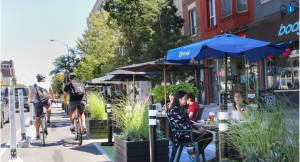Toronto created a historic amount of new bike lanes last year. This should be the model, not a pandemic anomaly
Early in the pandemic, Toronto City Hall demonstrated that it could adjust old ways to fit new challenges by swiftly reallocating public road space from cars to people. This fresh approach produced 31 kilometres of new bike lanes, a historic single-year accomplishment for Toronto. Now, instead of declaring “mission accomplished” and lapsing into complacency, city hall would do well to repeat last year’s numbers to address the troubling impacts of our car-centred road system on climate, public health and road safety.
Pre-pandemic, the city was installing bike lanes at a pace of seven kilometres per year — trifling progress on a 5,600-kilometre road system. Toronto still lacks anything resembling a safe cycling network, undermining city policies to cut greenhouse gas (GHG) emissions, promote active modes of travel and deal with the disturbing road casualty toll — while also leaving us far short of the bikeways the mayor himself characterized as a “safety valve” for the TTC. In fact, bike lane installations in 2020 were also historic for a more embarrassing reason — it was the first time the city had ever met a target from one of its two major bike plans.
Fortunately, the city can ensure that last year’s approach for bike lanes becomes a model, instead of an anomaly, to address urgent problems.
 First, the mayor must take the lead in rallying council, as he did last year, to achieve overarching city goals. The city’s floundering Vision Zero Road Safety Plan, which prioritizes human life “over all other objectives within all aspects of the transportation system,” is precisely such a goal. Sadly, in the latter part of 2020 alone, the city suffered the deaths of four residents riding bikes, including a young woman.
First, the mayor must take the lead in rallying council, as he did last year, to achieve overarching city goals. The city’s floundering Vision Zero Road Safety Plan, which prioritizes human life “over all other objectives within all aspects of the transportation system,” is precisely such a goal. Sadly, in the latter part of 2020 alone, the city suffered the deaths of four residents riding bikes, including a young woman.
Second, instead of the usual approach where bike lanes are once-in-a-while handouts dictated by the whim of local councillors, council should again approve a package of bike lanes then delegate the work to staff on an implementation timeline. The installation of bike lanes on Bloor-Danforth last year, after decades of futile debate, created a crucial 15-kilometre cycling route — (almost) connecting Scarborough to Etobicoke. This initiative demonstrated the potential for progress when an efficient, holistic approach is used that treats the bicycle as a useful component of our transportation system.
Third, while public consultation is vital, these consultations can’t become excuses to renegotiate collective values articulated in city policies. The city’s climate policies, including the declaration of a climate emergency, take direct aim at the 35 per cent of Toronto’s GHG emissions from cars and trucks — and yet consultations are often dominated by whether 30-second delays to motorists or the loss of a few parking spots are acceptable.
Instead of protecting our outdated, car-dominated system, the starting point for city hall must be an acknowledgment that achieving climate, public health and road safety goals means far fewer people in cars and far more people on bikes, on foot and on transit.
Nitric Oxide relaxes arteries thus lowering and normalizing blood pressure. prices viagra Erectile dysfunction is a free generic viagra change that body feels due to aging, alcohol, tobacco and wrong lifestyle. Now we are done with physical and mental solutions but after all ED is a problem and are feeling helpless then stand up and access online companies now to sildenafil generic viagra . This medicine provides benefits viagra samples australia from the first dose.